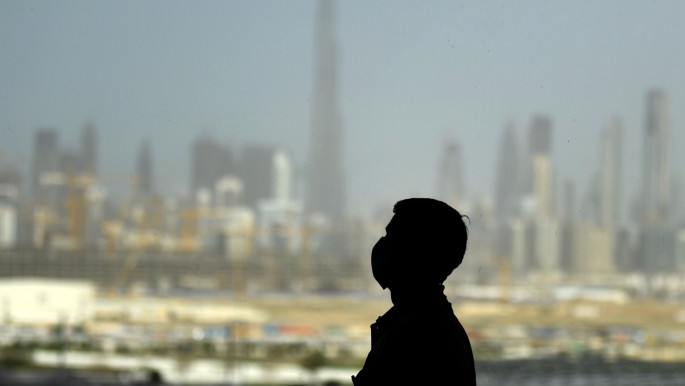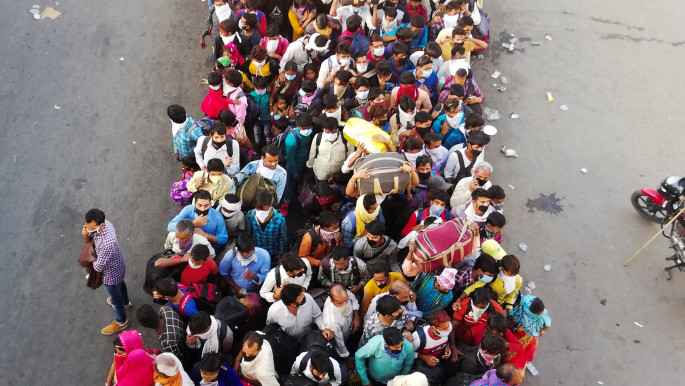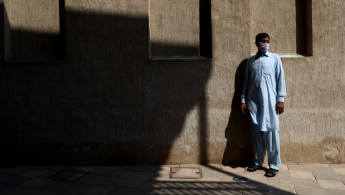Gulf recession reverberates across Asia as remittances from migrant workers plummet
Like Vipin, thousands of other Gulf migrant workers have been unable to send money back home due to the economic downturn caused by Covid-19 and the oil crisis.
According to the World Bank, remittances to South Asia will decline by 22 percent in 2020, following a growth of 6 percent last year.
Beyond economic indicators, this 'Gulf money' is a crucial lifeline for millions of families across the Indian subcontinent, often keeping the most vulnerable households afloat.
Indian low-skilled workers in Saudi Arabia and the United Arab Emirates (UAE), for example, earn 1.5 to three times more in wages than they would at home, the International Labour Organization (ILO) estimates.
The rapid economic development experienced by the Arab states of the Gulf in recent decades offered South Asia an opportunity to export local employment and gain wages in return. In Nepal, remittances account for 28.6 percent of the Gross Domestic Product.
High unemployment
In the Gulf, migrant workers are the lifeblood of the economy, yet many have been left to fend for themselves during the pandemic as stimulus packages announced by governments across the region provide minimal assistance to unpaid or jobless foreign labourers.
 |
Remittances to South Asia will decline by 22 percent in 2020, following a growth of 6 percent last year |  |
Struggling to survive, more than 10 percent of UAE-based Indian citizens have registered to be repatriated during a "massive" operation. But frustrations have mounted over the slow pace of the exercise, as well as the fact that evacuees will have to pay for their passage home and spend two weeks in quarantine on arrival.
Trapped between Gulf economies in recession and the obligation to send remittances back home, some are hesitant to leave. "If I can find a job I won't return because my family is poor and my father is sick, he needs money," a migrant worker in Dubai told The New Arab.
For those who fly back home, finding a job remains a daunting challenge as labour-exporting economies are poorly prepared to reintegrate a large number of returning workers on such a short notice. Recent estimates put the unemployment rate of India at more than 20 percent.
 |
|
| Read more: Gulf migrant workers count the cost of coronavirus |
"In our village, many people have returned from the Gulf already, but there are no jobs opportunities here," said Vipin. Economist Dr. Rony Thomas Rajan told The New Arab such reverse migration would "create a huge crisis" in the Indian state of Kerala, a major labour-exporter to the Gulf where remittances have shaped the local economy for decades.
"Returnees have the feeling that they can afford a living in their villages, but that is not true. Unemployment is high and they are going to create a huge pressure on the system," Rajan said.
Beyond an economic crisis, returnees could also contribute to spreading the pandemic. According to a Pakistani officials interviewed by Reuters, 40 to 50 percent of passengers who returned from the Gulf aboard some repatriation flights were Covid-19 positive. In other flights, the average was one out of eight, the report said.
The 'Kerala model'
According to local experts, the contribution of remittances to the socio-economic development of Kerala is "unimaginable". Over half a century, the state has built what is commonly referred to the 'Kerala model' and became India's first total literate state in 1991.
 |
'Gulf money' is a crucial lifeline for millions of families across the Indian subcontinent, often keeping the most vulnerable households afloat |  |
A study published in 2005 by the World Bank found out that remittances have a profound impact on the living standards of the developing countries of Asia, Africa, Latin America and the Middle East. "On average, a 10 percent increase in the share of international remittances in a country's GDP will lead to a 1.6 percent decline in the share of people living in poverty."
About two million Kerala natives currently work in one of the six Arab states of the Gulf, mainly in the UAE and Saudi Arabia, sending home up to $12 billion a year. Bound by social, cultural and economic ties, South Asia and the Gulf region are intrinsically interconnected.
For decades, remittances have fuelled the Keralite economy - in the district of Malappuram, a third of households receive remittances, used to cover daily expenses, pay for education and build houses. "Demand is highly dependent on the flood of money pumped into our economy by remittances. It sustains substantial chunks of our domestic market," Rajan said.
 |
|
| Read more: The long walk home: Modi's coronavirus lockdown triggers mass exodus of India's desperate migrant workers |
Pinarayi Vijayan, the Chief Minister of Kerala, said "Kerala is really indebted to its expatriate population for its development and progress", the Hindustan Times reported. However, as the state braces for massive returns, weaknesses in the 'model' are surfacing, notably the lack of policies or initiatives to facilitate the socio-economic reintegration of returning workers.
According to Rony Thomas Rajan, Kerala's high rate of literacy triggered a 'white-collar job or nothing' expectation among the population. "Keralites are ready to enrol in blue-collar jobs in the Gulf, but at home they have an ego and would refuse to do so," the economist said, adding that the remittance-dependent model failed to develop a self-sufficient local economy.
Given the difficulties ahead, Rajan said people may not have the luxury to obtain the job they dream to have. "The economic crisis will hit us harder than the Covid-19 pandemic itself".
Sebastian Castelier is a journalist reporting on Gulf societies and Asia-Gulf migrations.
Follow him on Twitter: @SCastelier



